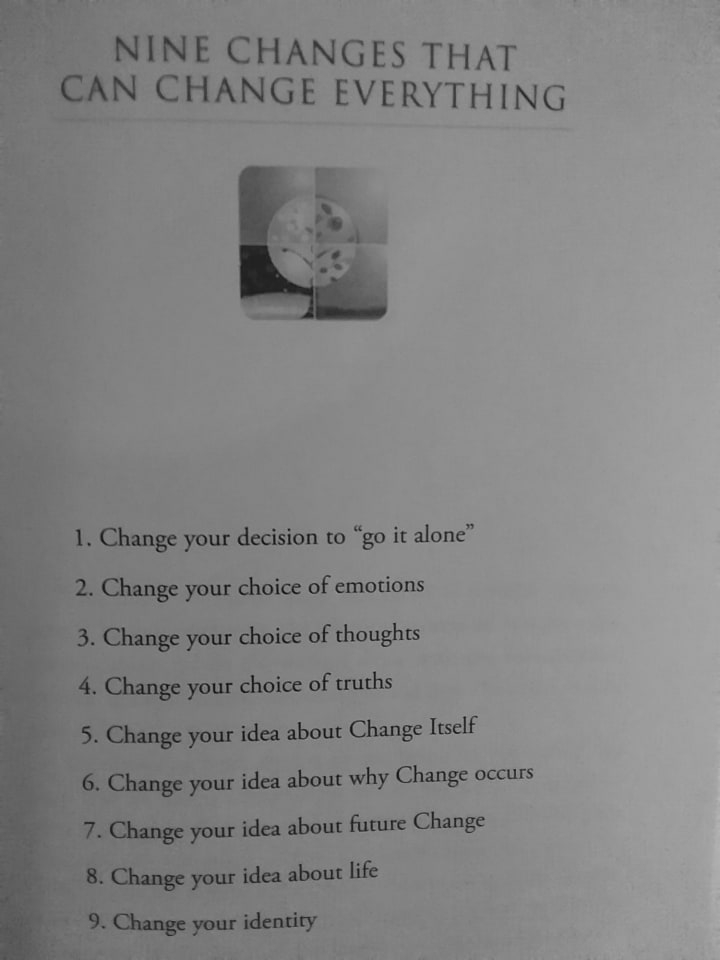
When Everything Changes, Change Everything, by Neale Donald Walsch seemed like an appropriate book to read in 2020, the Year of the COVID 19 Pandemic. Especially when you read the subtitle: In a Time of Turmoil, a Pathway to Peace. Who could deny that this is a time of turmoil and wouldn’t want a pathway to peace at any time, but especially now?
“How are you handling change?” The back cover asks. “Does ‘change’ have to equal ‘crisis’?” These are both very timely questions and what drew me to the pages of this book.
What you find on the pages of When Everything Changes, Change Everything are nine changes. They are:
#1 Change your decision to go it alone.
#2 Change your choice of emotions.
#3 Change your choice of thoughts.
#4 Change your choice of truths.
#5 Change your idea about Change itself.
#6 Change your idea about why Change occurs.
#7 Change your idea about future Change.
#8 Change your idea about life.
#9 Change your identity.

From reading the changes like this they may seem really difficult, especially the last couple, but they build on each other, so that by the time you’re faced with changing your idea about life or changing your identity, you’re more prepared and capable of accepting and making the change.
On looking back on them now, having read the book, some of these changes seem really obvious, but I know that’s only because I have the benefit of having read the book and understanding what they mean.
Neale Donald Walsch packs a lot of ideas into his books and it can sometimes feel overwhelming to try and absorb them all, much less to act on them. I had read several of his other books, most notably his Conversations With God series, so I knew his writing style. I didn’t find them to be the kind of books that I could just sit down and read and read and read. They needed time to think, re-read, and digest.
It was the same with this book. But what he did in this book to help was build in pauses, breathing spaces, and breaks. Literally. I recommend taking advantage of them, and following the guidance Walsch offers. I believe you’ll get much more from the book that way.
As with other books I’ve read by this author, I use sticky notes generously, and make written notes for review (though not in the margins like he suggests—next time I read it something else may stick out for me and I want to discover that with a fresh perspective).
Of all the great advice and ideas this book provided about dealing with change, for me the part that had the most impact came in chapter 24, The Ninth Change, and it comes even before the introduction of what the ninth change is (change your identity). I think that if I read only this chapter, I would have felt this book had a major impact on my life.
The chapter starts with this statement: “Here is what I now understand: Some souls co-create experiences that are clearly (on a human level) hurtful and damaging to themselves.” It then goes on to say, and this is what really spoke to me, “Then I can decide who I am in relationship to them.”
It puts the question “who am I and who do I choose to be” in front of a variety of situations, some global, some personal. For example,
“Who am I, and who do I choose to be, in relationship to the oppressed and the downtrodden?”
“Who am I and who do I choose to be in relationship to my own incredibly good fortune…”
His questions led me to ask my own.
Who am I and who do I choose to be in the face of COVID 19 and the corresponding quarantine and lockdown?
Who am I and who do I choose to be in the face of mass unemployment, my own included?
Who am I and who do I choose to be in the face of the current political climate?
So that I (hopefully) never forget these questions, and will continue to ask them of myself, I typed out and printed this section of the book. The page is now taped to my bathroom mirror.
Change is inevitable, as we all know, and is really only considered good or bad by how we think about it. So why not think about how you think about it, and if you don’t like it, change how you think about it, and maybe be just a bit happier or more peaceful.
That’s what When Everything Changes, Change Everything helps you do.
When Everything Changes, Change Everything, by Neale Donald Walsch, Hampton Roads Publishing Co Inc., 2009.
About the Creator
Tricia H
Dog mom, Texan, amateur photographer,crafter, reader, writer.






Comments
There are no comments for this story
Be the first to respond and start the conversation.